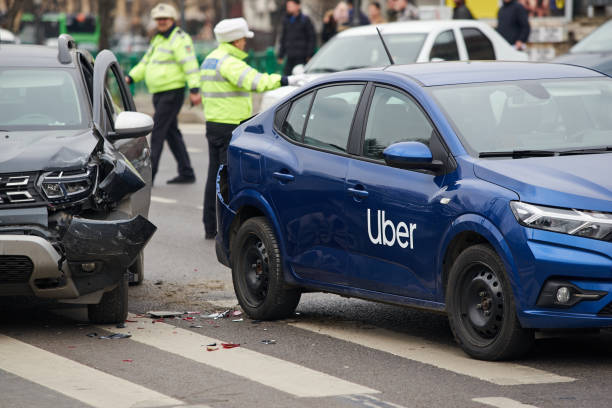Waterford Rideshare Accident Lawyer
Do you need a Waterford rideshare accident lawyer? If you or a loved one has been involved in an accident with an Uber, Lyft, or rideshare driver—whether as a passenger, another driver, or even a pedestrian—you have rights. Understanding these rights and navigating the complexities of rideshare accident claims requires the help of an experienced attorney. At Etemi Law, we are dedicated to helping victims of rideshare accidents receive the compensation they deserve.
Call us today at (203) 409-8424 for a


The Reality of Rideshare Accidents
Uber and Lyft have revolutionized transportation, providing millions of rides daily across the U.S. However, with the rise of these services, the number of rideshare-related accidents has also increased. Research from Rice University and the University of Chicago suggests that ridesharing services have contributed to a 2-3% increase in U.S. traffic fatalities since 2011, leading to up to 1,100 deaths annually.
Common Causes of Rideshare Accidents
Uber and Lyft drivers often operate under challenging conditions, increasing their risk of accidents. Some of the most common causes include:
- Distracted Driving – Relying on GPS, accepting ride requests, and managing passengers can divert a driver’s attention.
- Driver Fatigue – Many rideshare drivers work long hours or multiple jobs, leading to drowsy driving.
- Unfamiliar Routes – Navigating new areas can cause sudden stops or erratic driving behavior.
- Poor Vehicle Maintenance – Rideshare drivers are responsible for keeping their vehicles in good working condition, but lapses can lead to preventable accidents.
Connecticut Rideshare Laws and Regulations
Connecticut has strict laws governing rideshare companies and their drivers. These include:
- Mandatory Background Checks – Uber and Lyft must conduct background checks on all drivers, including a criminal record and driving history review.
- Vehicle Safety Requirements – Vehicles must pass inspections and meet specific safety criteria.
- Insurance Coverage – Rideshare companies must provide at least $1 million in liability coverage when drivers are transporting passengers.
- Driver Hour Limits – Uber and Lyft drivers can work a maximum of 14 consecutive hours and 16 hours in a 24-hour period to prevent fatigue-related accidents.
Who is Liable in a Rideshare Accident?
Determining liability in an Uber or Lyft accident can be complex, as multiple insurance policies may be involved. Our legal team at Etemi Law will investigate your case to establish liability and maximize your compensation.
If Another Driver is At Fault
- The at-fault driver’s insurance is the first line of compensation.
- If the at-fault driver is uninsured or underinsured, Uber/Lyft’s uninsured motorist coverage may apply.
If the Rideshare Driver is At Fault
- If the driver was logged into the app and waiting for a ride request, Uber/Lyft provides $50,000 per person/$100,000 per accident in bodily injury coverage.
- If the driver was transporting a passenger, Uber/Lyft provides $1 million in liability coverage.
- If the driver was off duty, their personal auto insurance applies.
Why You Need a Waterford Uber and Lyft Accident Lawyer
Rideshare accident cases involve multiple insurance companies and complicated liability issues. Insurance companies often try to minimize payouts, but with an experienced attorney from Etemi Law, you can fight for the full compensation you deserve.
Our legal team will: ✅ Investigate the accident thoroughly ✅ Obtain key evidence, including rideshare records and driver logs ✅ Negotiate aggressively with insurance companies ✅ Take your case to court if necessary
Contact Etemi Law Today
If you or a loved one has been injured in an Uber or Lyft accident, don’t wait. Protect your rights and get the compensation you deserve. Contact Etemi Law today for a free consultation.
📞 Call us at (203) 409-8424 💻 Visit us online to schedule your case review
Winter in Waterford turns familiar corridors into hazards: I-95 and Boston Post Road (US-1) become slick ribbons where rideshare drivers, commuters and tourists confront black ice and leaf-packed runoff. As an investigative observer I watch how merges and short pickups near exits amplify rear-end and mirror-swipe collisions. Rideshare mechanisms — app dispatching, surge pickups and on-the-fly reroutes — interact with fragile traction to raise the odds of soft-tissue and whiplash injuries.
Near Harkness Memorial State Park and the shoreline parking lots, I often find slips that begin as minor tumbles and end with fractured wrists, concussions or knee ligament strains. Weekend visitors stepping from rideshare cars onto leaf-slick asphalt or frosted wooden boardwalks create predictable patterns: low-speed falls, pedestrian-versus-doorway incidents, and tricky transfers from vehicles to walkways. These scenes shape how injuries present and how quickly people seek urgent care.
When emergency responders move through snow-clogged side streets or black-ice stretches, transport times shift; ambulances may detour and sometimes hospital teams coordinate interfacility transfers by stretcher or squad. Lawrence Memorial Hospital in nearby New London is the regional receiving center, and in winter I document delays where rideshare dropoffs to urgent care are followed by later transfers to the ED. That chain affects imaging, orthopedics consults and early rehab referrals.
Rideshare as first response sometimes short-circuits immediate ambulance transport, and when snow and ice slow follow-up appointments patients describe staggered rehab: initial home-based PT, then outpatient therapy along Route 156, then specialty clinics near Niantic Bay. My reporting zeroes in on how those stepwise patterns change recovery timelines and why timely documentation of transport, photos of road conditions and prompt clinical notes matter for care continuity without promising outcomes.
